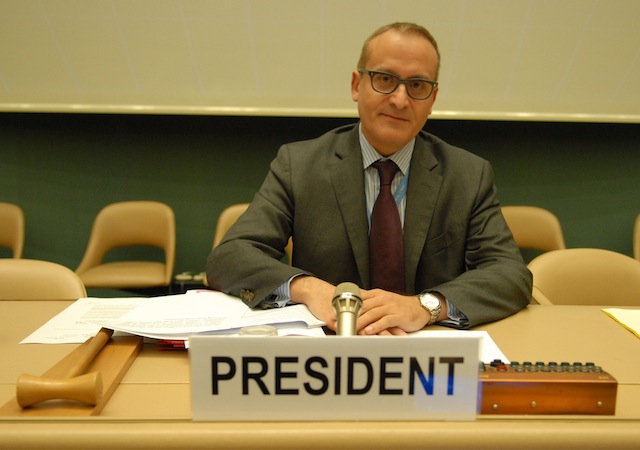
Nations agree to take on killer robots!

The Campaign to Stop Killer Robots welcomes the historic decision taken by nations to begin international discussions on how to address the multiple challenges posed by fully autonomous weapons. It marks the beginning of a process that the campaign believes should lead to an international ban on these weapons to ensure there is always meaningful human control over targeting decisions and the use of violent force.
At 4:47pm on Friday, 15 November 2013 at the United Nations in Geneva, states parties to the Convention on Conventional Weapons (CCW) adopted a report that included a mandate for the convention to convene on 13-16 May 2014 for its first meeting to discuss questions related to “lethal autonomous weapons systems.” Also known as fully autonomous weapons or “killer robots,” these weapons have not yet been developed, but technology is moving rapidly toward increasing autonomy.
A total of 117 states are party to the Convention on Conventional Weapons, including nations known to be advanced in developing autonomous weapons systems: United States, China, Israel, Russia, South Korea, and United Kingdom. Adopted in 1980, the framework convention contains five protocols, including Protocol I prohibiting non-detectable fragments, Protocol III prohibiting the use of air-dropped incendiary weapons in populated areas, and Protocol IV, which preemptively banned blinding lasers.
The agreement to begin work in the Convention on Conventional Weapons next year could lead to a future CCW Protocol VI prohibiting fully autonomous weapons.
The Campaign to Stop Killer Robots believes that robotic weapons systems should not be making life and death decisions on the battlefield. That would be inherently wrong, morally and ethically. Fully autonomous weapons are likely to run afoul of international humanitarian law, and there are serious technical, proliferation, societal, and other concerns that make a preemptive ban necessary.
We support any action to urgently address fully autonomous weapons in any forum. The decision to begin work in the Convention on Conventional Weapons does not prevent work elsewhere, such as the Human Rights Council.
The agreement to begin an international process on these weapons comes just seven months after the launch of the Campaign to Stop Killer Robots, a global coalition of 45 non-governmental organizations in 22 countries that is coordinated by Mary Wareham of Human Rights Watch. The campaign calls for a pre-emptive and comprehensive ban on the development, production, and use of fully autonomous weapons.
The campaign is grateful to Ambassador Jean-Hugues Simon-Michel of France, President of the Convention on Conventional Weapons meeting, for his work to secure the mandate for governments to work on fully autonomous weapons.
Since the topic was first debated at the Human Rights Council on 30 May 2013, a total of 44 countries have spoken publicly on fully autonomous weapons: Algeria, Argentina, Australia, Austria, Belarus, Belgium, Brazil, Canada, China, Costa Rica, Croatia, Cuba, Ecuador, Egypt, France, Germany, Ghana, Greece, Holy See, India, Indonesia, Iran, Ireland, Israel, Italy, Japan, Lithuania, Madagascar, Mexico, Morocco, Netherlands, New Zealand, Pakistan, Russia, Sierra Leone, Spain, South Africa, South Korea, Sweden, Switzerland, Turkey, Ukraine, United Kingdom, and United States. All nations that have spoken out have expressed interest and concern at the challenges and dangers posed by fully autonomous weapons.
The Campaign to Stop Killer Robots urges nations to prepare for extensive and intensive work next year, both within the CCW and outside the CCW context. We urge states to develop national policies, and to respond to the call by UN Special Rapporteur on extrajudicial, summary or arbitrary executions Prof. Christof Heyns for national moratoria on fully autonomous weapons.
The Campaign to Stop Killer Robots urges states to return to the Convention on Conventional Weapons in November 2014 and agree to a new mandate to begin negotiations on a treaty to ban fully autonomous weapons.
The following spokespersons of the Campaign to Stop Killer Robots are available for comment on the decision to begin international work on fully autonomous weapons:
- In Geneva: Mary Wareham, HRW, Tel. +1 (646) 203-8292, wareham[@]hrw.org,@marywareham
- In Geneva: Beatrice Fihn, WILPF, Tel. +41-78-613-0472, beatrice[@]reachingcriticalwill.org, @beafihn
- In London: Thomas Nash, Article 36, Tel. +44-7711-926-730, thomas[@]article36.org, @nashthomas
- In Ultrecht: Miriam Struyk, IKV Pax Christi, +31-6-48-98-14-93, struyk[@]ikvpaxchristi.nl,@miriamstruyk
- In Washington, DC: Noel Sharkey, ICRAC, +44(0)7771-977-726, robot[@]blueyonder.co.uk, @StopTheRobotWar
For more information, see:
- Backgrounder on the Convention on Conventional Weapons
- UN website on the Convention on Conventional Weapons
- Statement by the Campaign to Stop Killer Robots
- Report by WILPF’s Reaching Critical Will project
- Statement, press release,and memo to delegates by Human Rights Watch
- Statement, press release, and memo to delegates by Article 36
- Statement by ICRAC
- Statement by IKV Pax Christi
Photo: Ambassador Jean-Hugues Simon-Michel of France (c) Campaign to Stop Killer Robots, 15 November 2013


